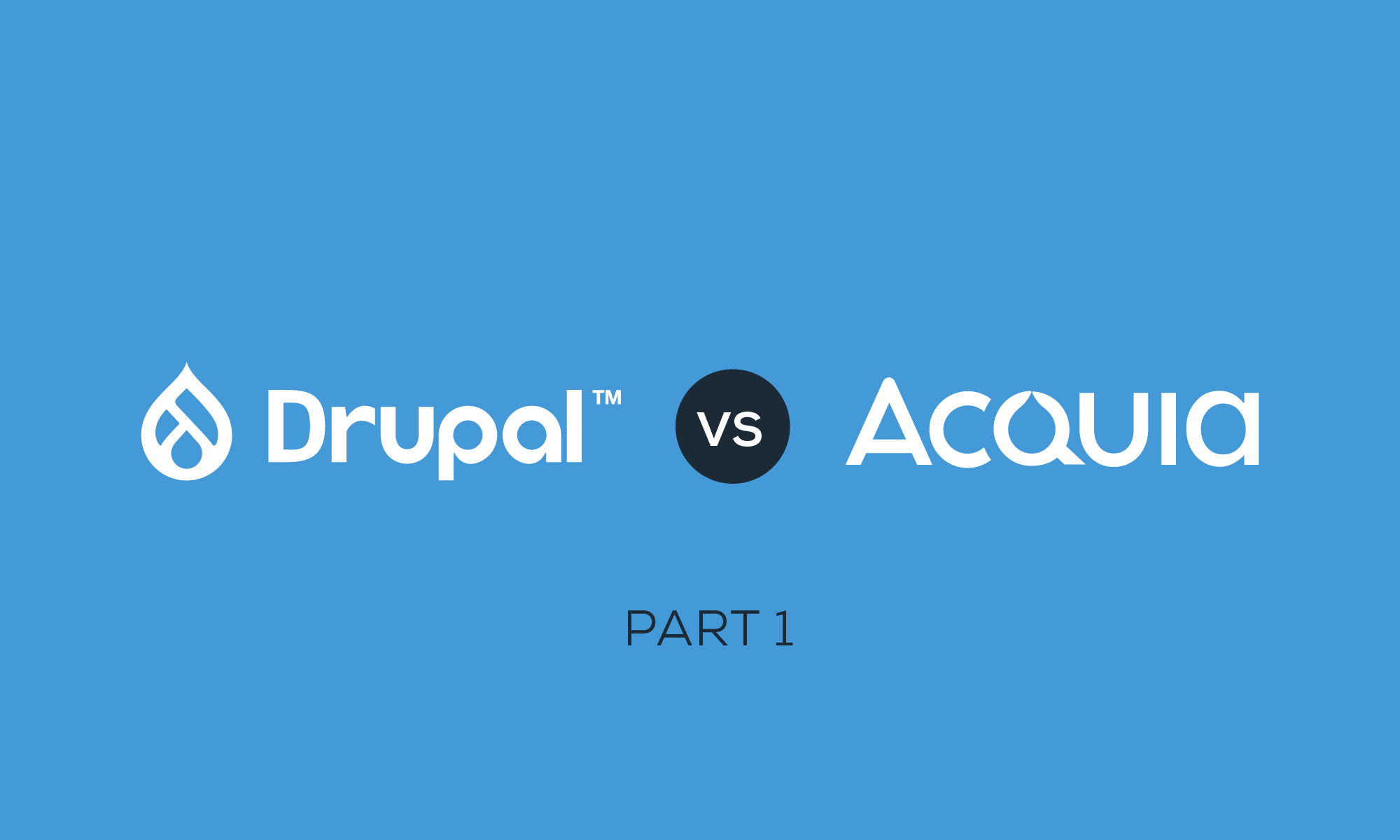Drupal vs. Acquia: Understanding the Differences - Part 1
If you’ve looked into content management systems (CMS) to create and host websites, you’ve come across Drupal — but what is Acquia? Some online reviews and content may make you think it is a Drupal vs. Acquia debate. In reality, the two work together.

Before we get into how Drupal and Acquia are linked, let’s go over what they are and how they differ.
What is Drupal?

Drupal was created in 2000 by Dries Buytaert, a software programmer from Belgium, while he was completing his master's degree. Drupal is an open-source CMS, sometimes referred to as a content management framework (CMF), allowing people to create free websites! It’s written in PHP and enables you to create a robust and customizable website without writing all the code from scratch.
Currently, Drupal accounts for around 13% of the websites on the internet. Despite being open-source, it's a secure and compliant cloud hosting with various compliance offerings to meet industry standards, including FedRAMP, HIPAA, PCI, and more. It’s also the CMS for many high-level political, corporate, government, and educational websites.
What is Acquia?

Acquia is a Software-as-a-Service (SaaS) company co-founded by Dries Buytaert, powering digital experiences for over one-quarter of the F100. Acquia is recognized by analysts like Forrester, Gartner, and IDG as a leader in not just CMS but also Digital Experiences. They acquired Widen, a Digital Asset Management (DAM) Company, in 2021 and were recently recognized by Forrester as a leader in the DAM Wave (get the report). Acquia is designed to offer technical support and additional products and services for Drupal. Although Acquia provides its services for a cost, they are the largest contributor of code and the only certification provider for members of the Drupal community. Acquia employs several full-time Drupal contributors and over 200 certified Drupal developers.
Acquia offers additional services that Drupal does not. When considering Acquia as a hosting provider for Drupal, these are the benefits that Acquia provides:
- Cloud-based platform
- Built-in security through secure and compliant cloud
- Migration to Drupal from other CMS platforms
- 24-7 monitoring and overall simplified management through full managed hosting
- Support and analytics of the site
- Faster time to market
- Less technical maintenance for your team
- Faster load time
- Drupal Training
- More advanced customization
- Maintenance on many of Drupal’s free modules
What is the major difference?
It should be more apparent that Acquia was created to offer managed services that complement Drupal, making it easier for developers and technical teams to build digital experiences rather than manage their sites. When we consider the cost associated with the two, it may appear as though Drupal is more affordable. However, Drupal is not free. The prices of hosting, updating software, and security requirements all add up. Acquia may initially seem more expensive, but this is only because these costs are neatly rolled together, with the addition of the services mentioned above, into a monthly fee.
Both platforms offer a variety of essential third-party integrations. Drupal can integrate with Bitium, Zendesk, Zapbook, MailChimp, HubSpot, LinkedIn, Facebook, Google Analytics, Magento, Salesforce and Zapier. Acquia can integrate with all these platforms as well but also has a technology partner program allowing brands to integrate with Commerce Platforms (Commercetools, ElasticPath, and Kibo), Search (Yext, Algolia, Searchstax), Translations (Translations.com and) or Optimization (SiteImprove). In addition to these, it also offers integration with Amazon and Manifest.
It’s important to remember what each platform is responsible for. Drupal is a CMS platform, whereas Acquia is more related to service. Acquia is more focused on providing fully managed cloud hosting, including tools that accelerate deployments, cost reductions, security, time to market, etc., that help you manage content, grow your business, and optimize your digital business. It’s also more dedicated to large enterprises and medium businesses rather than small businesses or freelancers. Drupal can provide a web platform to any level of professional, from freelancers to large-scale enterprises.
What does Acquia mean for Drupal?
Despite some worry that Acquia would lock Drupal into proprietary software, the two services are separate and can work together or as standalone software. The benefit of Acquia is that it allows Buytaert to provide leadership and innovation to the Drupal community to continue growing the Drupal CMS.
It is crucial to recall this whenever you see the term “Acquia Drupal”, meaning there have been additional benefits, not that Acquia is either taking over Drupal authority or that this is a particular version of the CMS you should know about.
Hosting a Drupal website with a Platform as a Service (PaaS) such as Acquia means taking advantage of all the benefits we’ve talked about: lower infrastructure costs, faster time to market, and the flexibility to design your product with Drupal. In addition, Acquia has built-in services for Drupal’s constant upgrades, like Drupal 7 to 8 this past November.
Have you updated your site to Drupal 9 yet?
At Symetris, our team is here to help you utilize the tools available to create a website that converts. Stay up to date and competitive with minimal downtime by partnering with a trusted team of experts. Get in touch today to learn more about what solution would work best for you.